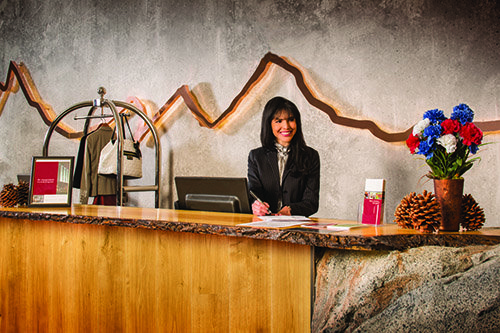
What to Know About Amazon Alexa in Hotels
As Amazon’s Alexa virtual assistant continues its march toward American household ubiquity, its push to become a permanent guest in most hotel rooms has gained steam.
In June 2018, Amazon launched Alexa for Hospitality to put Alexa in hotel rooms. Amazon wants to help hotels, vacation rentals and other hospitality operators deliver “immersive experiences” to delight guests and boost staff productivity. The idea is to take the popular virtual assistant, which many already comfortably use in their homes, and use it to connect hotel guests with existing hospitality services and amenities.
Imagine staying at a hotel and having Alexa as a personal concierge, housekeeper or maintenance worker who is at your beck and call 24 hours a day, seven days a week.
“Alexa… I need to order room service.”
“Alexa… where is the pool?”
“Alexa… set a wake-up call for 6 a.m.”
These are the sorts of questions and commands Alexa in hotel rooms answers and executes to supplement guest services and make guests’ stays more comfortable. Using a property-managed, in-room Amazon Echo, Echo Dot or Echo Plus device, hotel operators can enable guests to adjust thermostats, play music, order room service, schedule housekeeping services or find the fitness center or pool, all by voice command.
Guests can also temporarily sync their Amazon Prime accounts so they can watch their favorite TV shows and listen to their audiobooks or Amazon, Spotify or Pandora playlists. This level of personalization lets weary and homesick travelers bring a piece of home with them to make their stays more comfortable.
Amazon allows hotel operators to buy Echo units in bulk, but prices vary and are undisclosed.
Setting up Alexa in hotel rooms is easy. Plug in an Echo device in a room and connect it to a centralized console that serves as a hub for all the hotel’s Echo devices. Such consoles can manage “hundreds of Alexa devices” at a hotel property, Amazon says. Alexa for Hospitality Echo units come programmed with relevant hotel skills, such as calling the front desk or assisting with check-outs. The console allows hotel operators to specify device settings, check device state and remotely reset devices to prepare for the next guest. Hotel operators can customize experiences to their brands in order to deliver unique experiences by selecting Alexa skills that match their brand personality and add them to guest rooms through the console.
Operators can also connect Alexa for Hospitality with existing hotel technologies and hospitality solution providers, such as programs from DigiValet, Intelity, Nuvola and Volara, so generic guest requests to “order pizza” or “book a spa treatment” get routed correctly to property management, point-of-sale and guest request systems for fulfillment, Hotel Management notes.
Behind the scenes, hotel operators can analyze Alexa for Hospitality data to measure guest engagement and then adapt services based on guest feedback, Hotel Management adds. For example, Alexa can ask guests questions about their stays or to rate service levels. It’s a great way to get consistent, real-time feedback that operations can act upon quickly.
Since the introduction of virtual assistant devices like Alexa, some users have had privacy and security concerns. To alleviate these concerns, Amazon says Alexa for Hospitality has built-in layers of privacy protection:
- Wake word – Alexa will not stream audio to the cloud until activated by her wake word “Alexa.”
- Microphone on/off button – Using Alexa is optional. Echo devices have a microphone on/off button built on top of the device. When the microphone on/off button is pressed, the microphones are electrically disconnected, cannot detect the wake word, and cannot stream any audio to the cloud. A light ring around the top of the device will turn red when the microphone is disconnected.
- Clear indicator – When Alexa hears her wake word, the light will be activated and turn blue to indicate that she’s sending audio to the cloud. A green ring indicates calling and a yellow light ring indicates that a message is available.
- Privacy – Amazon encrypts all data in transit between the Amazon Echo and Amazon’s servers, and all customer data is securely kept on Amazon AWS servers. Properties can’t listen to what guests say to Alexa or what she says back. When a guest checks out, the Echo is programmed to disconnect from that guest’s Amazon account.
Of course, no existing virtual assistant, including Amazon Alexa in hotels, can replace the human touch or the physical delivery of hospitality services. Devices cannot clean rooms, change sheets or deliver towels… yet. Alexa for Hospitality is a supplement that empowers hospitality staffs, especially those that are small businesses, by immediately connecting guests’ service requests to the right teams. “By routing routine tasks, like housekeeping or room-service requests, Alexa for Hospitality enables your staff to focus on the guest interactions that matter most,” Amazon says.
EMPLOYERS is committed to helping small businesses, including hoteliers, operate safer, more efficient workplaces. Contact EMPLOYERS® today to learn more about our cost-effective workers’ compensation insurance.
The information provided is intended to provide a general overview. This information is not legal advice and should not be relied on as such. EMPLOYERS® makes no warranties for the accuracy, adequacy, or completeness of the information provided, and will not be responsible for any actions taken based on the information contained herein. If you have legal questions or need legal advice, please consult an attorney.
